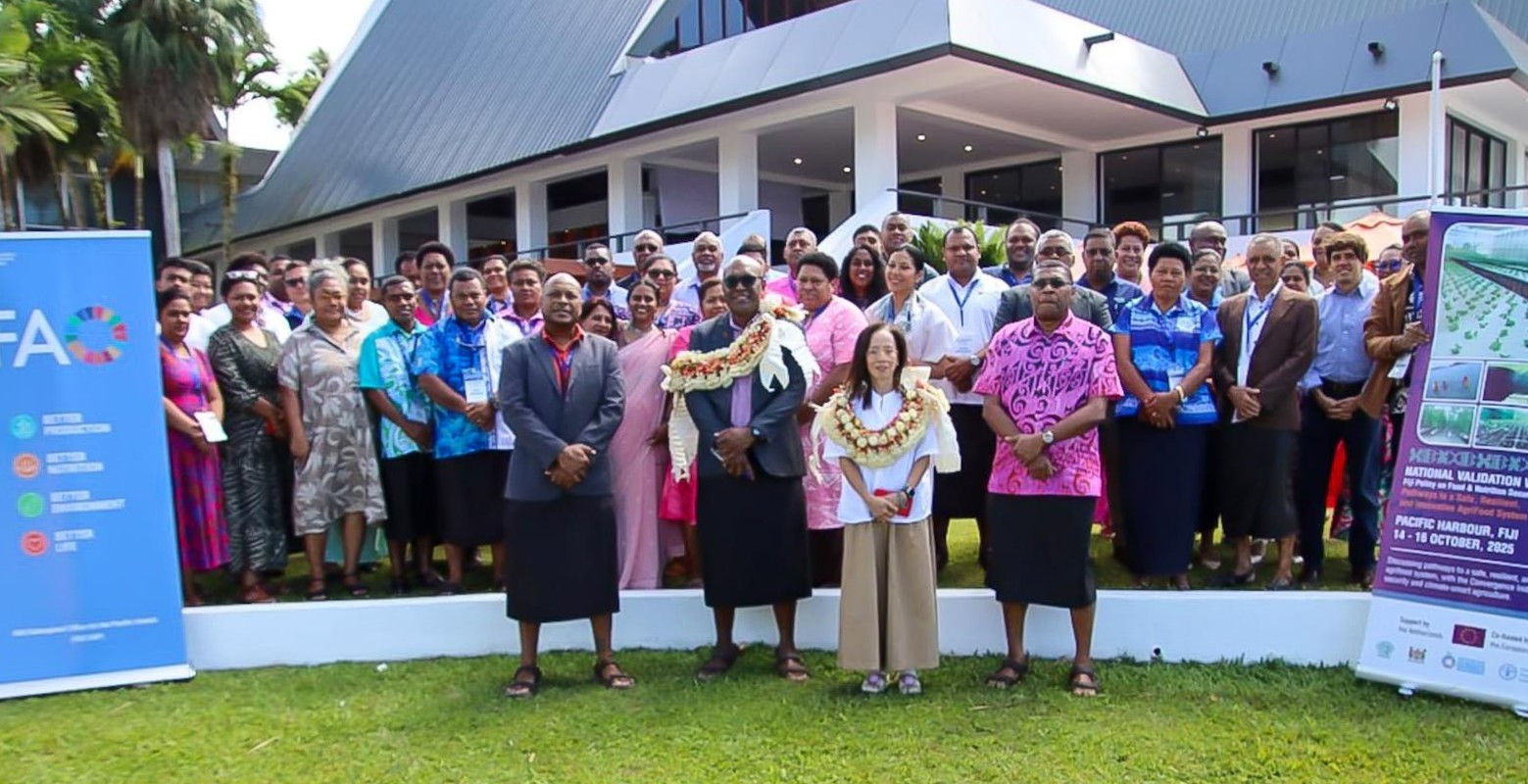From policy to students’ awareness: Fiji and FAO celebrated World Food Day 2025

Pacific Harbour, Fiji - 17 October 2025 – Fiji celebrated World Food Day this year with two key activities: the Validation and Handing Over of Fiji’s Food and Nutrition Security Policy; and a National Celebration with students and communities at Deuba District School at Serua province.
From policy to student action, the Government of Fiji and the Food and Agriculture Organization of the United Nations (FAO) are working hand-in-hand for better food and a better future for all Fijians, carrying the spirit of this year’s World Food Day global theme. World Food Day is observed annually every 16 October. It also marks the founding of FAO, and this year is FAO’s 80th anniversary. Fiji became a member of FAO in 1971 and has held a national World Food Day celebration since 1981.
“Fiji is grateful for 54 years of long-standing support from FAO. Our partnership is advancing Fiji’s sustainable development, food security and resilience,” said the Minister of Agriculture and Waterways, Hon. Tomasi Tunabuna at the National Celebration of World Food Day at Deuba District School.
Raising students’ awareness of a better food future
Speaking in front of around 500 participants, Hon. Tunabuna reminded the public that “food embodies culture and community, making today not just a celebration but a united call to transform our food system across all sectors.”
“It challenges us to deliver the Four Betters which are: Better Production through climate-smart, efficient, and inclusive agriculture; Better Nutrition by addressing non-communicable diseases and undernutrition, Better Environment by protecting our land, water, reefs, and biodiversity; and Better Life through empowering every Fijian, from the highlands of Naitasiri to the islands of Lau.”
He further emphasized that agriculture remains vital to Fiji, sustaining over 60% of rural households and remaining deeply connected to the nation’s economy, culture, and future.
Assistant FAO Representative, Joann Young joined the Minister at the event. Addressing mostly primary school students, she highlighted the importance of their role in ensuring a nutritious future for Fiji: “You are the future of Fiji. You can help by learning about healthy food, growing your own vegetables, and sharing what you learn with your friends and family. You are part of the solution.”
National Food and Nutrition Security Policy (2025-2030)
The event also marked a historic moment – the official handover of the National Food and Nutrition Security Policy (2025-2030) to the Ministry of Health and Medical Services, reinforcing Fiji’s commitment to a healthier, more resilient, and food-secure nation.
The policy was validated through a three-day workshop (14-16 October). It brought together over 150 participants from government ministries, UN agencies, development partners, academia, civil society, and the private sector to validate Fiji’s National Food and Nutrition Security Policy (2025-2030) and advance the Convergence Initiative for Food Security and Climate-Smart Agriculture.
“Food systems transformation is not only about what we grow, but how we nourish our people and protect our planet. This policy brings those dimensions together,” said Hon. Ratu Atonio Rabici Lalabalavu, Minister of Health and Medical Services.
“The European Union is proud to support this critical consultation on Fiji’s food systems transformation through the Scalable Success Model Project, funded by the European Union,” said Barbara Plinkert, the European Union Ambassador to the Pacific. “This is a timely opportunity to address pressing challenges like malnutrition and rising food imports through strategic reforms, including the reallocation of land resources to high-value, nutritious, and climate-resilient crops. By fostering linkages between agriculture and tourism, promoting import substitution, and expanding exports of premium commodities, we can unlock the full potential of Fiji’s agricultural sector to drive economic growth, improve nutrition, and build long-term food security.”
“Fiji’s leadership exemplifies the convergence of food systems and climate action,” said Dr. Stefanos Fotiou, Director of the UN Food Systems Coordination Hub, in his opening remarks. “This workshop demonstrates what transformation looks like in practice – linking national priorities to global solidarity, translating pathways into action, and ensuring that no community is left behind.”
Media contact: Gayatri I Gusti, International Communications Specialist – FAO Pacific Islands, [email protected] / +6857703172
About FAO
Food and Agriculture Organization of the United Nations (FAO) is the specialized UN agency which has been leading international efforts to defeat hunger and malnutrition for 80 years. In the Pacific Islands, FAO has a Subregional Office for the 14 Pacific Island countries based in Apia, Samoa and several country offices, including one in Suva, Fiji. For more information, visit: https://www.fao.org/asiapacific/about-us/fao-in-asia-and-the-pacific/pacific/en
About the UN Food Systems Coordination Hub
The UN Food Systems Coordination Hub drives and connects country-led efforts to transform food systems by 2030. It provides tailored support to turn national commitments into impactful action, leveraging the capacities of the entire UN system. The Hub convenes governments, financiers, civil society, the private sector, and science to coordinate knowledge, resources, and partnerships that accelerate sustainable change. For more information, visit: www.unfoodsystemshub.org
